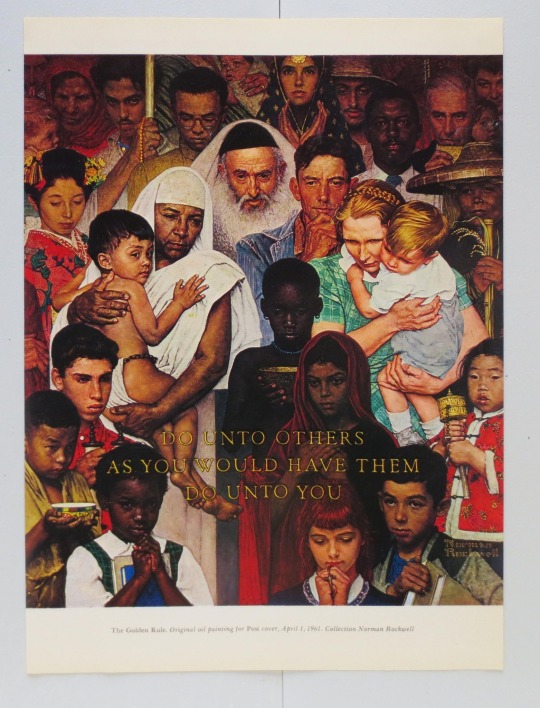#The Golden Rule
Explore tagged Tumblr posts
Text
THE WASTELANDS GOLDEN RULE XD

As a person that gets distracted by side quests this is 1000% true XD
#video games#tv shows#tv series#fallout#fallout tv show#fallout tv series#the ghoul#the golden rule#thou shalt get sidetracked#funny pics
821 notes
·
View notes
Text
Starkid really loves their dark reprises that come immediately after the original song, don't they?






#team starkid#starkid#twisted#starkid twisted#sands of time#the golden rule#the golden rule (evil reprise)#nerdy prudes must die#npmd#starkid npmd#bully the bully#bury the bully#the guy who didn't like musicals#cup of roasted coffee#cup of poison coffee#tgwdlm#tgwdlm starkid
2K notes
·
View notes
Text

The Golden Rule, 1961
Artist: Norman Rockwell
Do unto others as you would have them do unto you.
#The Golden Rule#painting#1961#reddit#museum#norman rockwell#russian_bagel#the golden rule#1960s#people#humans#humanity#art#artist#painter#do unto others as you would have them do unto you#human rights
25 notes
·
View notes
Text
Learning To Reverse the Golden Rule
As we mentioned in our last article, Kitty and I recently taught a workshop on burnout. We did a ton of research around it. Obviously, we already knew that burnout sucks and is bad (not our hottest take, historically). But that research led us to a much deeper, scarier understanding of exactly how widespread and devastating burnout really is. It’s the difference between knowing how big a blue whale is because Google told you, and knowing how big a blue whale is because it’s rising up from the water beneath you.
The causes of burnout aren’t straightforward. A variety of cultural, organizational, and individual traits work together to burn a person out. Although bigger structural issues deserve the lion’s share of blame, individual struggles with perfectionism, breakneck compulsory productivity, and a cruel inner voice appear in story after story.
I recognize those struggles in the stories we’ve heard from readers. And from many personal friends and loved ones. And from my coblogger, Kitty.
But most especially, from myself.
Keep reading.
Did we just help you out? Join our Patreon!
34 notes
·
View notes
Text

Today I parted ways with Reddit for the final time.
What was the straw that broke the camel's back?
Well, the Purple Rule: Before I say it, would I say it to her?
You know, recently I had noticed that I was saying certain things and saying them in a casual, off-handed manner.
I was disappointed with myself.
Why was I saying those things?
Why did I have to be like that?
After awhile, figuring out human nature turns into kind of a dog chasing its own tail type of thing.
So instead, a simple solution is not at all an inferior solution.
In fact, it may be just exactly what many of us need right now in the worst sort of way.
I know I did.
Before MLP FIM became a thing in my life, I would have agreed with the Purple Rule in principle, philosophically, safely in the abstract.
It wasn't until I met Twilight Sparkle that I could form a clear picture of what the Purple Rule really looks like.
Once I had that picture, putting the Purple Rule into practice was easy.
This is now the first time in my whole life that I've started practicing the Purple Rule with anything like the consistency and mindfulness that I often talk about in relation to other things.
And I don't care if it's not the most macho thing to say.
I feel so much better.
So, it is absolutely not surprise to me at all, given a long and unhappy history that we already shared, that Reddit would not abide even the mention of the Purple Rule.
This is so perfect, it entirely figures.
The godlike-attitude having, gatekeeping, power rabid mods of r/MyLittleMemes had tolerated every other silly, zany, weird, off or dumb meme I'd submitted because those were acceptably meaningless.
Today I posted this image, with a caption explaining everything I've said above, in a much shorter and humorous way.
The post was up for less than five minute before being taken down.
I experienced errors publishing a post about the incident to my own profile, and then I was just about fed up.
I further experienced odd technical glitches deleting my account.
No, I can't prove anything, but I'm also not trying to get anything besides my First Amendment rights, God help me.
Moderators on Reddit are entirely unaccountable for the job they do.
Not one of them has ever been reigned in.
That's because Reddit has this kind of pernicious totalitarian ideology about how discourse on the internet should happen.
It almost sounds like some kind of hipster Neo-Darwinian thing.
Only the "best" ideas "win" engagement.
Ideas are only tolerated within entirely arbitrary and metric informed ranges.
In other words, it's all about money and control.
If you're not with their program, you're not gonna last on their site.
REDDIT detests and despises the Purple Rule, because Reddit exists for one reason;
To monetize and weaponize damage, division, outrage, rage-bait, click-bait, toxic conspiracies and all the other things that turn humanity against itself and tear the fabric of societies apart.
Of course a post about the Purple Rule wouldn't last an hour on Reddit.
I am not trying to tell any pony else what they should or should not do.
But in my case, I would have betrayed everything that Equestria has ever stood for, if I had remained on that ugly cesspool of a site for a single moment longer.
I was already fed up with Reddit before I created a new account in support of my interest in My Little Pony.
But, trying to be a good Equestrian, I figured I'd give Reddit one more chance.
After all I was going back onto the site for very different reasons this time.
In a world that is presently reveling only in the things that make it ugly, MLP and its fans courageously, but non-violently buck the trend.
I thought that being on Reddit for different reasons would result in a different experience and a better outcome.
How could I have been so naive and stupid?
A salutary reminder that the internet is not irl, and that this irl is not Equestria...not even close.
Well I learned my lesson.
Types like me aren't welcome on Reddit and the Purple Rule is considered an ideological sin to the folks who profit off of mayhem and chaos.
Whereas, a site like Tumblr or a traditional Forum, those are both far superior venues for an interest like MLP FIM.
On Tumblr, if you're not promoting hate speech, you can publish whatever the hell you want to, just about.
You might not be attracting hundreds of instances of engagement, but you can peacefully have your own little corner of the hive mind.
On a traditional forum, other folks may do a little more to keep you accountable.
But, on a forum like that, actual relationships can form.
People can get to know you, and they can come to care about you.
Reddit makes it difficult for users to get to know each other.
Forums are all about users who know each other.
So, people might check you, but the mods tend to have a very personal investment in the good of the site.
Mods and Admins on traditional forums often put in dozens of unpaid hours every week, to keep things running smoothly.
They may be the ones paying, or doing the labor to actually keep the site up.
Forum Mods and Admins are far more likely to have a deeply felt, sincere interest in seeing their communities succeed, and that does a great deal to set us all up for success.
Mods on Reddit are looking to mess up as many people as possible.
It's only about the numbers on Reddit.
Nothing human ever occurs to Reddit and certainly nothing Pony ever occurs to them.
So okay, I am not on Reddit. You can't follow Night Sky on Reddit.
Too bad.
It's not clear to me that the decent start I got off to, over the course of a few weeks, ever mattered even a little.
Whereas, because of how people have treated me on Tumblr and on the Forum, I know it matters a great deal.
I'm not being unfair or demanding.
Everyone I've had any real interaction with on the Forum or Tumblr has been very welcoming or at least civil.
It just goes to show you that the internet can be a great thing, as much as it can be a bad thing.
But it's the intent that really matters.
Tumblr and Forums have what we can safely call a good intent, generally speaking.
But that's not true of Reddit.
I'm sorry, I got to call it like I see it.
Reddit is a bad actor.
I am sorry about the length and tone of this post, but you know what, this matters.
I'm not gonna get on the net and try to put the best of myself out there, as a person and as a pony, only to look the other way when an internet titan steam rolls over the Purple Rule, like I was spreading some kind of unhealthy subversion.
If they do that to me, I will part ways with them and not associate with them anymore.
But I will also not fail to tell my story and decry what happened.
Standing up to bad actors like Reddit is a very Equestrian thing I can, and will do.
And yes, there is nothing in this post that I would not tell Princess Twilight Sparkle about.
I'd tell Princess Celestia, Princess Luna and Princess Cadence about it.
The EUP needs to know, if you let Reddit onto Equestria's ISPs, Canterlot will crumble!
The surveillance capitalist, algorithmic beast will find the fault lines, split them wide open, mine them for money and ad revenue, and will then leave a fractured and ruined society in its wake.
Where Reddit holds sway, the Tireks are elected officials, the Queen Chrysalis's are healthcare professionals and the Cozy Glows are educators.
That's wrong, and I'd be a pretty sorry pony indeed if I didn't have the courage to say so.
#mlp fanart#my little pony#mlp#mlp art#mlp fim#mlp g4#my little pony fanart#mlp friendship is magic#mlp princess celestia#mlp princess luna#mlp fluttershy#mlp applejack#mlp discord#mlp pinkie pie#mlp rainbow dash#mlp twilight sparkle#mlp fan art#mlpfim#mlp shitpost#mlp rant#reddit#mlp princess twilight#princess cadance#princess twilight sparkle#the golden rule#the purple rule#mlp rarity
12 notes
·
View notes
Text

19 notes
·
View notes
Text


It's not gay if it's the undead
Please, I need someone to design me a T-shirt with @akinmablog 's words PLEASE I WILL PAY REAL MONEY
#we couldn’t keep this hidden in the shadows of discord#amc iwtv#daniel molloy#dean winchester#supernatural#the golden rule
12 notes
·
View notes
Text
“we’re not animals. we’re gifted with minds to reason and hearts to love.”
is a quote i didn’t expect to come from a parody musical of aladdin
22 notes
·
View notes
Text

Norman Rockwell - “The Golden Rule” Post cover 4/1/61.
19 notes
·
View notes
Text
By: Michael Shermer
Published: Aug 19, 2023
In my previous Skeptic column, Deconstructing the Decalogue, I offered a personal view on how to think about the Ten Commandments from the perspective of 3,000 years of moral progress since they were first presented in two books of the Old Testament (Exodus 20:1-17 and Deuteronomy 5:4-21). Here I would like to reconstruct them from the perspective of a science- and reason-based moral system, a fuller version of which I developed in my 2015 book The Moral Arc, from which this material is partially excerpted.
Note: This is a purely intellectual exercise. I am not a preacher or teacher of moral values, nor do I hold myself up as some standard-bearer of morality. Since I do not believe in God, nor do I think that there are any rational reasons to believe that morals derive from any source outside of ourselves, I feel the necessity to offer an alternative to religious- and faith-based morality, both descriptively (where do morals come from if not God?) and prescriptively (how should we act if there is no God?), which I have done in 30 years of publishing Skeptic magazine and in a number of my books, including How We Believe (1999), The Science of Good and Evil (2004), and the aforementioned The Moral Arc. Here I am building on the work of secular philosophers and scholars from the ancient Greeks through the Enlightenment and into the modern era where a massive literature exists addressing these deep and important matters.
The problem with any religious moral code that is set in stone is just that—it is set in stone. Anything that can never be changed has within its DNA the seeds of its own extinction. A science-based morality has the virtue of having built into it a self-correcting mechanism that does not just allow redaction, correction, and improvement; it insists upon it. Science and reason can be employed to inform—and in some cases even determine—moral values.
Science thrives on change, on improvement, on updating and upgrading its methods and conclusions. So it should be for a science of morality. No one knows for sure what is right and wrong in all circumstances for all people everywhere, so the goal of a science-based morality should be to construct a set of provisional moral precepts that are true for most people in most circumstances most of the time—as assessed by empirical inquiry and rational analysis—but admit exceptions and revisions where appropriate. Indeed, as humanity’s concept of “who and what is human, and entitled to protection” has expanded over the centuries, so we have extended moral protection to categories once thought beneath our notice.
Here are some suggested commandments for our time. Feel free to add your own in the comments section below.
1. The Golden-Rule Principle: Behave toward others as you would desire that they behave toward you.
The golden rule is a derivative of the basic principle of exchange reciprocity and reciprocal altruism, and thus evolved in our Paleolithic ancestors as one of the primary moral sentiments. In this principle there are two moral agents: the moral doer and the moral receiver. A moral question arises when the moral doer is uncertain how the moral receiver will accept and respond to the action in question. In its essence this is what the golden rule is telling us to do. By asking yourself, “how would I feel if this were done unto me?” you are asking “how would others feel if I did it unto them?”
2. The Ask-First Principle: To find out whether an action is right or wrong, ask first.
The Golden Rule principle has a limitation to it: what if the moral receiver thinks differently from the moral doer? What if you would not mind having action X done unto you, but someone else would mind it? Smokers cannot ask themselves how they would feel if other people smoked in a restaurant where they were dining because they probably wouldn’t mind. It’s the nonsmokers who must be asked how they feel. That is, the moral doer should ask the moral receiver whether the behavior in question is moral or immoral. In other words, the Golden Rule is still about you. But morality is more than just about you, and the Ask-First Principle makes morality about others.
3. The Happiness Principle: It is a higher moral principle to always seek happiness with someone else’s happiness in mind, and never seek happiness when it leads to someone else’s unhappiness through force or fraud.
Humans have a host of moral and immoral passions, including being selfless and selfish, cooperative and competitive, nice and nasty. It is natural and normal to try to increase our own happiness by whatever means available, even if that means being selfish, competitive, and nasty. Fortunately, evolution created both sets of passions, such that by nature we also seek to increase our own happiness by being selfless, cooperative, and nice. Since we have within us both moral and immoral sentiments, and we have the capacity to think rationally and intuitively to override our baser instincts, and we have the freedom to choose to do so, at the core of morality is choosing to do the right thing by acting morally and applying the happiness principle. (The modifier “force or fraud” was added to clarify that there are many activities that do not involve morality, such as a sporting contest, in which the goal is not to seek happiness with your opponent’s happiness in mind, but simply to win, fairly of course.)
4. The Liberty Principle: It is a higher moral principle to always seek liberty with someone else’s liberty in mind, and never seek liberty when it leads to someone else’s loss of liberty through force or fraud.
The Liberty Principle is an extrapolation from the fundamental principle of all liberty as practiced in Western society: The freedom to think, believe, and act as we choose so long as our thoughts, beliefs, and actions do not infringe on the equal freedom of others. What makes the Liberty Principle a moral principle is that in addition to asking the moral receiver how he or she might respond to a moral action, and considering how that action might lead to your own and the moral receiver’s happiness or unhappiness, there is an even higher moral level toward which we can strive, and that is the freedom and autonomy of yourself and the moral receiver, or what we shall simply refer to here as liberty. Liberty is the freedom to pursue happiness and the autonomy to make decisions and act on them in order to achieve that happiness.
Only in the last couple of centuries have we witnessed the worldwide spread of liberty as a concept that applies to all peoples everywhere, regardless of their race, religion, rank or social and political status in the power hierarchy. Liberty has yet to achieve worldwide status, particularly among those states dominated by theocracies and autocracies that encourage intolerance, and dictate that only some people deserve liberty, but the overall trend since the Enlightenment has been to grant greater liberty, for more people, everywhere. Although there are setbacks still, and periodically violations of liberties disrupt the overall historical flow from less to more liberty for all, the general trajectory of increasing liberty for all continues, so every time you apply the liberty principle you have advanced humanity one small step forward.
5. The Fairness Principle: When contemplating a moral action imagine that you do not know if you will be the moral doer or receiver, and when in doubt err on the side of the other person.
This is based on the philosopher John Rawls’ concepts of the “veil of ignorance” and the “original position” in which moral actors are ignorant of their position in society when determining rules and laws that affect everyone, because of the self-serving bias in human decision making. Given a choice, most people who enact moral rules and legislative laws would do so based on their position in society (their gender, race, class, sexual orientation, religion, political party, etc.) in a way that would most benefit themselves and their kin and kind. Not knowing ahead of time how the moral precept or legal law will affect you pushes you to strive for greater fairness for all. A simpler version is in the example of cutting a cake fairly: if I cut the cake you choose which piece you want, and if you cut the cake then I choose which piece I want.
6. The Reason Principle: Try to find rational reasons for your moral actions that are not self-justifications or rationalizations by consulting others first.
Ever since the Enlightenment the study of morality has shifted from considering moral principles as based on God-given, Divinely-inspired, Holy book-derived, Authority-dictated precepts from the top down, to bottom-up individual-considered, reason-based, rationality-constructed, science-grounded propositions in which one is expected to have reasons for one’s moral actions, especially reasons that consider the other person affected by the moral act. This is an especially difficult moral commandment to carry out because of the all-too natural propensity to slip from rationality to rationalization, from justification to self-justification, from reason to emotion. As in the first commandment to “ask first,” whenever possible one should consult others about one’s reasons for a moral action in order to get constructive feedback and to pull oneself out of a moral bubble in which whatever you want to do happens to be the most moral thing to do.
7. The Responsibility and Forgiveness Principle: Take full responsibility for your own moral actions and be prepared to be genuinely sorry and make restitution for your own wrong doing to others; hold others fully accountable for their moral actions and be open to forgiving moral transgressors who are genuinely sorry and prepared to make restitution for their wrong doing.
This is another difficult commandment to uphold in both directions. First, there is the “moralization gap” between victims and perpetrators, in which victims almost always perceive themselves as innocent and thus any injustice committed against them must be the result of nothing more than evil on the part of the perpetrator; and in which perpetrators may perceive themselves to have been acting morally in righting a wrong, redressing an immoral act, or defending the honor of oneself or family and friends. The self-serving bias, the hindsight bias, and the confirmation bias practically ensure that we all feel we didn’t do anything wrong, and whatever we did was justified, and thus there is no need to apologize and ask for forgiveness.
As well, the sense of justice and revenge is a deeply evolved moral emotion that serves three primary purposes: (1) to right wrongs committed by transgressors, (2) as a deterrent to possible future bad behavior, (3) to serve as a social signal to others that should they commit a similar moral transgression the same fate of your moral indignation and revenge awaits them.
8. The Defend Others Principle: Stand up to evil people and moral transgressors, and defend the defenseless when they are victimized.
There are people in the world who will commit moral transgressions against us and our fellow group members. Either through the logic of violence and aggression in which perpetrators of evil always feel justified in their acts, or through such conditions as psychopathy, a non-negligible portion of a population will commit selfish or cruel acts. We must stand up against them.
9. The Expanding Moral Category Principle: Try to consider other people not of your gender, sexual orientation, class, family, tribe, race, religion, or nation as an honorary group member equal to you in moral standing.
We have a moral obligation not only to ourselves, our kin and kind, our family and friends, and our fellow in-group members; we also owe it to those people who are different from us in a variety of ways, who in the past have been discriminated against for no other reason than that they were different in some measurable way. Even though our first moral obligation is to take care of ourselves and our immediate family and friends, it is a higher moral value to consider the moral values of others, and in the long run it is better for yourself, your kin and kind, and your in-group to consider members of other groups to be honorary members of your own group, as long as they so honor you and your group (see #8 above).
10. The Biophilia Principle: Try to contribute to the survival and flourishing of other sentient beings, their ecosystems, and the biosphere as a whole.
Biophilia is the love of nature, of which we are a part. Expanding the moral sphere to include the environments that sustain sentient beings is the loftiest of moral commandments.
If by fiat I had to reduce these Ten Commandments to just one it would be this:
Try to expand the moral sphere and to push the arc of the moral universe just a bit further toward truth, justice, and freedom for more sentient beings in more places more of the time.
#Michael Shermer#morality#secular morality#the golden rule#ten commandments#the ten commandments#religion is a mental illness
12 notes
·
View notes
Text
Learning To Reverse the Golden Rule
Note: I talk about suicidal ideation and post-traumatic stress in this post. If you don’t feel ready for those topics, maybe skip this one! And if you struggle with suicidal thoughts, please call 988 for help and resources from the Suicide and Crisis Hotline.*
18 notes
·
View notes
Text
Before confronting someone, think to yourself: Would I value hearing what I'm about to say if our roles were reversed?
#original post#spilled ink#spilled thoughts#spilled in writing#spilled words#spilled writing#writers on tumblr#relationships#resolve conflicts#think about it#compassion#the golden rule
2 notes
·
View notes
Text

AMEN!🙏
#Hate is not a Christian value#Judge not lest ye be judged#worship God#hypocrisy is not a Christian value#Love your fellow man even when he's being a Dick#the golden rule#do unto others
36 notes
·
View notes
Note
I feel like Roy needs to remember the golden rule. It's not gay in a three way.
youtube
3 notes
·
View notes
Text
Learning To Reverse the Golden Rule
As we mentioned in our last article, Kitty and I recently taught a workshop on burnout. We did a ton of research around it. Obviously, we already knew that burnout sucks and is bad (not our hottest take, historically). But that research lead us to a much deeper, scarier understanding of exactly how widespread and devastating burnout really is. It’s the difference between knowing how long a blue…

View On WordPress
109 notes
·
View notes
